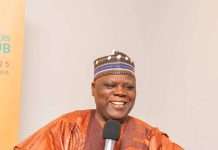In this exclusive interview with Pharmanews, Pharm. (Chief) Emeka Achonye, an elder in the pharmacy profession and managing director, Citygate Pharmacy, Aba, Abia State, takes a closer look at some topical issues affecting pharmacy practice in Nigeria, especially the seemingly intractable challenge of invasion by charlatans. Excerpts:
Tell us a bit about your early days
I grew up in Lagos, where I had my post-primary education before being admitted to study Pharmacy at the University of Nigeria, Nsukka, Enugu State, where I graduated in 1977. Sincerely speaking, one of the best things that have happened in my life is that I studied Pharmacy. It has helped me to meet and interact with so many people, as well as touching so many lives.
Luckily for me I have seven children and, to the glory of God, three of them are pharmacists. Right now, I am also practising in my own pharmacy in Aba, Abia State. To the glory of God, I see myself as one of the senior citizens in the profession and I am aging gracefully because, in a short time, I will be 70. So, I thank God for what He has done for me.
Tell us about your pharmacy and how it was at the beginning
I started working as a medical representative from 1979, when Pharmanews was established. At that time, once you were a medical rep what people used to identify you with was the Pharmanews sticker.
I started as a medical representative in Enugu and, later, I was transferred to Lagos, where I worked as Lagos area manager for SKF. I later left SKF and joined Roche, now Swipha, as area manager in charge of the entire Eastern and South South States, while I was based in Aba.
It was after I had spent eight years at Roche as area manager that I opened my own pharmacy, Citygate Pharmacy, around 1987. That was how I became a community pharmacist. But, along the line, I discovered that I was not getting enough to do, and that was what motivated me to go into publishing, with some inspiration from Pharmanews.
My first publication was a directory of all pharmacists in Abia State, where I come from. Later on, I added another one which is the directory of all community pharmacists in the 36 states of the federation, including their phone numbers. The goal was to improve networking and communication among pharmacists. This has been keeping me busy and helping me to tackle the problem pharmacists are having with traders taking our job from us. It has also been helping me to earn some money to add to what I get from the pharmacy.
Is the directory an annual publication?
Not at all. it is biennial (published every two years) because of the stress involved in information gathering. Besides, it is tasking and I always like to give it my best; so we still operate biennially for now.
As a stakeholder, how would you assess community pharmacy practice, especially here in the east where you practise?
No community pharmacist here in the east is finding it easy, with the challenge from drug fakers. The charlatans have virtually hijacked the profession from the professionals. I have always advised those who care to know that pharmacy practice has gone beyond buying and selling of drugs only, and I have used myself as a good example to them. I have said it times without number that pharmacists are not supposed to sit in their premises, waiting for people to come and buy drugs only. There are so many things that they can still do to make ends meet.
I am now into publishing, and coupled with the little sales we are making in the pharmacy, I am getting fulfillment and I am happy. The only aspect of Pharmacy that traders can hijack is just buying and selling and the pharmacist’s role is beyond that. I have always wondered how someone could spend five years in the university and end up as ordinary trader. Really, we pharmacists should endeavour to do more than mere trading.
How lucrative is community pharmacy practice in this part of the country?
Community pharmacy practice is very lucrative here in the east, but one must be ready to work very hard. I remember when we were in the university, we usually worked for almost 24 hours daily, with little or no time for social activities. It is quite unfortunate nowadays that most pharmacists, as soon they leave the university, they stop making efforts and become lazy. Many of them believe that their struggles and toiling have ended as soon as they have their degrees.
Moreover, for pharmacy practice to be lucrative, one must have a passion for the profession and must be ready to continually develop himself. I have practised the profession for the past 39 years and what has helped me is continuous and never-ending personal development.
How would you compare pharmacy practice when you started to the way it is now?
Pharmacy practice when I started was quite different from what we have today. We were very few then and the competition was not much. However, I will say it was the early practitioners that actually killed this profession because they were the ones that allowed charlatans and traders to hijack the profession from them.
Pharmacy then was very easy to practice and money was coming in effortlessly; so the practitioners became lazy as competition wasn’t there. You won’t believe that between 1960 and 1970, there were pharmacists who duplicated their licences, updated them and individually registered up 50 non-professionals, who would in turn pay them royalty, while they would be in their shops drinking and making merry. That was the beginning of our problem.
They (early practitioners) allowed charlatans to discover the lucrativeness of drug-selling and they (charlatans) started making better efforts, even more than pharmacists. They established cooperative societies and had stronger association, even better than the practitioners. Sometimes they contributed money for any of their members that was in need and, with that, they had more money to do business. And because of their strong ties, they usually got stocks at cheaper rates, but we pharmacists were still doing ‘one-man show’ and before we knew it, the profession had been hijacked from us.
If a patient went to buy a drug from a patent medicine vendor and the drug was not available, the vendor could freely go to his colleague to get the drug, and at the end they both shared the profit. No pharmacist would ever do that. In fact, no pharmacist would tell you to go to another pharmacy to buy what he didn’t have and that has continued till today.
If you hadn’t been a pharmacist, what other profession would you have practised?
Sincerely, if I were not a pharmacist, I would still have studied Pharmacy; in fact, nothing but Pharmacy. Pharmacy is a profession that gives me joy and I have never regretted being a pharmacist.
As an experienced pharmacist, how do you think the challenge of drug faking could be tackled?
As a matter of fact, the problem of drug faking in this country is the same with the challenge of ‘the Nigeria factor’, as they call it. It was disclosed recently by the outgoing UK Prime Minister, Mr David Cameron that Nigerians are ‘fantastically corrupt’ and that is the bitter truth. So, the challenge of drug faking would only be surmounted if corruption could be eradicated totally because there is nothing to gain in deceiving ourselves.
Majority of Nigerians see nothing wrong in cutting corners in the quest to make money. Our value system is so bad that people are ready to get money by all means, even if they have to kill, kidnap or destroy other people. What I am saying in a nutshell is that it is the quest to make more money in a crooked way that encourages drug counterfeiting. And it is until people realise the supremacy of God and have His fear in their minds that thing will get better. Until we kill corruption in the country, drug faking and other vices will never be eradicated.
What advice do you have for young pharmacists who are aspiring to come into community practice?
My advice to them is that they should have hope that things will change for the better very soon in pharmacy practice. I told some of my colleagues when we were discussing that the challenge we are having in the practice today had happened in the UK before and they overcame. What I am saying in essence is that this evil will not last forever as God will intervene in our case.
With determination and dedication, those who are determined to practise the profession genuinely will triumph and all the challenges we are facing today will become history. It is possible that this happens in our own time, or the generation to come, but it will surely happen.
So, they (aspiring community pharmacists) shouldn’t have any fear as pharmacy practice is the only profession that gives one satisfaction and fulfillment if practised properly and passionately.











